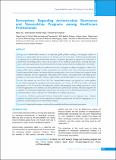Please use this identifier to cite or link to this item:
https://hdl.handle.net/20.500.14356/969Full metadata record
| DC Field | Value | Language |
|---|---|---|
| dc.contributor.author | Jha, Nisha | - |
| dc.contributor.author | Mudvari, Anish | - |
| dc.contributor.author | Hayat, Khezar | - |
| dc.contributor.author | Shankar, Pathiyil Ravi | - |
| dc.date.accessioned | 2023-04-18T07:13:57Z | - |
| dc.date.available | 2023-04-18T07:13:57Z | - |
| dc.date.issued | 2022 | - |
| dc.identifier.citation | JhaN., MudvariA., HayatK., & ShankarP. R. (2023). Perceptions Regarding Antimicrobial Resistance and Stewardship Programs among Healthcare Professionals. Journal of Nepal Health Research Council, 20(3), 689-696. https://doi.org/10.33314/jnhrc.v20i3.3992 | en_US |
| dc.identifier.issn | Print ISSN: 1727-5482; Online ISSN: 1999-6217 | - |
| dc.identifier.uri | http://103.69.126.140:8080/handle/20.500.14356/969 | - |
| dc.description | Original Article | en_US |
| dc.description.abstract | Abstract Background: Antimicrobial resistance is an important global problem resulting in an improper response of infections to antimicrobials and an increase in the duration and cost of treatment. Healthcare professionals play an important role in addressing Antimicrobial resistance and positive perception is important for involvement in antimicrobial stewardship policies. Hence the perception of key Healthcare professionals, including physicians, nurses, and hospital pharmacists, towards Antimicrobial resistance antimicrobial stewardship policies was studied. Methods: A cross-sectional study was conducted in a tertiary care hospital at Lalitpur, from January to March 2021 using stratified random sampling. An online questionnaire was circulated to the selected Healthcare professionals. Median Antimicrobial resistance and antimicrobial stewardship policy scores were calculated and compared among different subgroups. Previous engagement with Antimicrobial resistance and antimicrobial stewardship policies programs was also noted. Descriptive statistics, Mann Whitney, and Kruskal Wallis tests were used for data analysis. Results: The response rate was 89.3% (202/226). Antimicrobial resistance was regarded as a serious problem in the Nepali community by participants with work experience of 1-5 years, 87 (75.6%, p=0.029), and female participants, 62 (45.5%, p<0.001). Most physicians, females, and participants with working experience 1-5 years believed inappropriate use of antibiotics can harm patients and is professionally unethical. Physicians supported the availability of local antimicrobial guidelines and protocols. The median scores for Antimicrobial resistance (p<0.001) and Antimicrobial resistance eradication (p=0.048) differed according to age groups. Conclusions: Healthcare professionals believed Antimicrobial resistance was an important issue. Antibiotic guidelines developed should be strictly implemented. Healthcare professionals also believed inappropriate use of antibiotics can harm patients and is professionally unethical. Keywords: Antimicrobial resistance; antimicrobial stewardship; healthcare professional; perception. | en_US |
| dc.language.iso | en | en_US |
| dc.publisher | Nepal Health Research Council | en_US |
| dc.relation.ispartofseries | July-Sep, 2022;3992 | - |
| dc.subject | Antimicrobial resistance | en_US |
| dc.subject | Antimicrobial stewardship | en_US |
| dc.subject | healthcare professional | en_US |
| dc.subject | perception | en_US |
| dc.title | Perceptions Regarding Antimicrobial Resistance and Stewardship Programs among Healthcare Professionals | en_US |
| dc.type | Journal Article | en_US |
| Appears in Collections: | Vol 20 No 3 Issue 56 july-Sep, 2022 | |
Files in This Item:
| File | Description | Size | Format | |
|---|---|---|---|---|
| 3992-Manuscript-30777-1-10-20230314.pdf | 231.55 kB | Adobe PDF |  View/Open |
Items in DSpace are protected by copyright, with all rights reserved, unless otherwise indicated.
